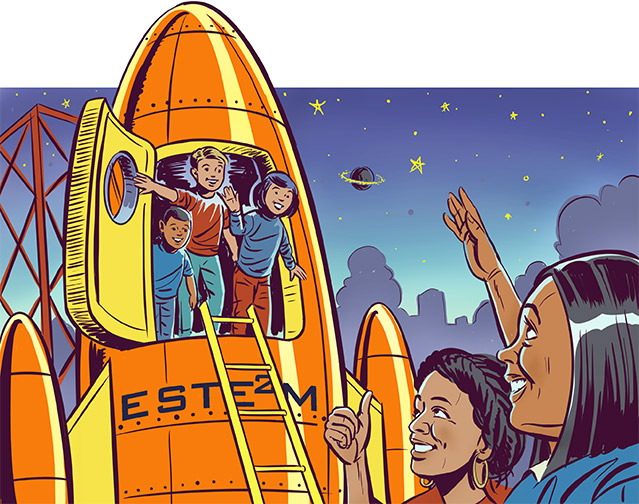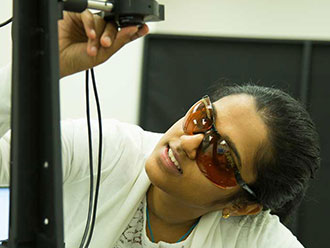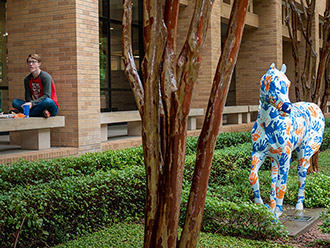After growing up with business-owner parents, Andrew “Frank” Ridout says he has entrepreneurship in his blood. While at UTA studying computer science and engineering, he embarked on a journey to living a vegan lifestyle. Plagued with a sweet tooth, he came to find there was a lack of vegan baked goods that hit the spot. So he took on the task himself.
When Ridout started baking and handing out his vegan chocolate chip cookies, he was met with rave reviews. Thus, Frankly GOOD was born.
Even with a celebrated product and entrepreneur parents, Ridout found that launching a business was no easy task.
“I started out just selling at local farmers markets,” he says. “But as I began envisioning expansions, I discovered there was a lot of nitty gritty, behind-the-scenes stuff that I knew nothing about.”
Then one of Ridout’s professors put up a flyer for the Maverick Entrepreneur Program (MEP) and Award Fund. Now, what started as a college project and hobby is a bustling business with mighty aspirations perfectly within reach.
Investing in the Next Generation
As a marketplace for ideas, UTA provides fertile ground for the creative process that produces new technologies and business innovations.
Through the MEP, the University is strategically educating and mentoring Maverick students to become the next generation of entrepreneurs and innovators, using a mix of instruction and real-world experience.
The program was born from the vision of an anonymous alumnus who gave $3 million to stir entrepreneurial spirit and creativity among UTA’s student body.
Since its inaugural semester in fall 2018, the MEP has welcomed more than 300 students from diverse academic disciplines and awarded more than $825,000 to budding entrepreneurs.
Jeff McGee, associate professor of management and one of the program’s two Entrepreneurial Faculty Fellows, says the generous investment from the program’s benefactor places UTA’s entrepreneurial initiative in the upper echelon of programs of its kind, with some of the most generous amounts of funding in the country.
Launching a Business from the Classroom
The MEP is rooted in and based on entrepreneurship courses in the College of Engineering and College of Business. These courses provide instruction and mentoring on business ideation, feasibility, and the pitch practice—all elements that make up Phase One of the MavPitch competition.
A signature component of the program, and what the engineering and business courses build to, the MavPitch competition is open to all UTA undergraduate and graduate students.
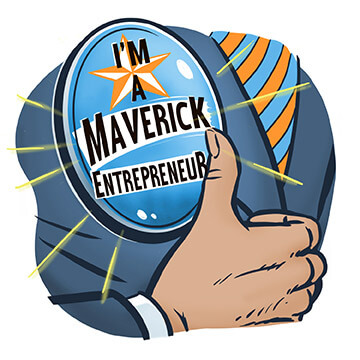
Robert Magnusson, professor of electrical engineering and Texas Instruments Distinguished University Chair in Nanoelectronics, helps with the MEP from the College of Engineering. He was recruited to UTA to introduce entrepreneurial “flavor” into courses in the engineering programs based on his own experience launching a business.
“My hope is that I can help students avoid mistakes I made,” Dr. Magnusson says. “If I had a class like this before beginning my business, I would’ve done better faster.”
For students not majoring in business or engineering, or students unable to enroll in one of the available courses, Dr. McGee says Phase One becomes a one-on-one education process.
UTA and MEP alumnae Ariel Bowman and LaTasha Taylor Starr, founders of ESTe2M Builders and participants in the program’s first year, say that the value of MEP is evident during this Phase One process.
“Jumping into business is intimidating for anyone, especially for non-business students like us,” Starr says. “We had the passion and vision to bring STEM learning to young people and underserved populations, but we didn’t have the business skills. Our time spent with Dr. McGee preparing for the MavPitch is where we put the puzzle together and made our business make sense in a way where we could be competitive while still being ourselves and true to our vision.”
Ridout says his Phase One experience was similar.
“These professors took so much time to help prepare me for the pitch competition,” he says. “I learned more about business and my own company in one week with them than I had in the entirety of Frankly GOOD’s existence up until that point.”
For students like Ridout, Starr, and Bowman, participating in the MEP and MavPitch meant the possibility of receiving invaluable funding for a business vision close to the heart.
Other students join the business or engineering courses with the hope of gaining new skills, though they’re not exactly ready to start a business, Magnusson says.
“For the students who don’t yet see themselves starting a business, we hope their time spent in the MEP can give them the perspective to evaluate the landscape of business once they take a job after graduation. If they know that starting a business is simpler than they think, they could identify spaces for improvement and launch a business that fills a hole once the time is right.”
Throwing Their Hat in the Ring
After finishing a semester of mentorship, developing their ideas, and forming a business plan, the students with dreams of launching a business distill their efforts into a three-minute video pitch for the online knockout round of MavPitch. From there, a panel of expert judges made up of faculty, alumni, and industry partners narrows the field of competitors.
McGee says the goal of this round is to identify teams or individuals with the most compelling venture pitches and ideas and that could compete most effectively if invited to the live round.
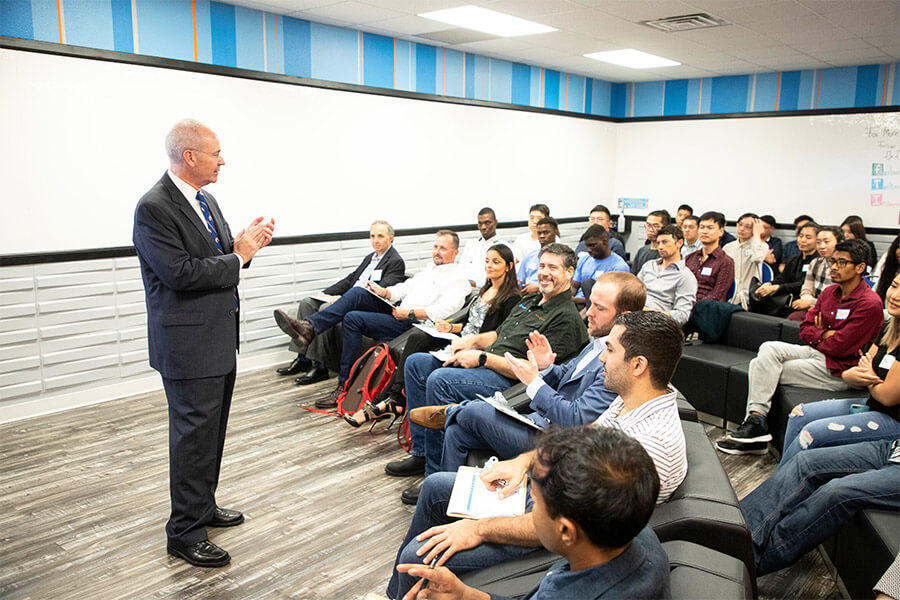
Associate Professor Jeff McGee addresses the audience before the 2019 MavPitch competition begins.
For Starr, making it through the video round was a moment of empowerment and assurance for the ESTe2M Builders concept.
“We were filled with fears of starting a business while in graduate school and competing with people developing world-class technology while we were trying to deliver an education-focused product,” Starr says. “For the judges to recognize our passion and the place education should have in entrepreneurship made us realize this was possible for us.”
The teams selected from the video round then move on to the Phase One live pitch competition, where they compete for up to $15,000 in investment funds.
Though it’s a competition, Venkat Devarajan, professor of engineering and the MEP’s other Entrepreneurial Faculty Fellow, says the program strives to keep education at the heart of its live pitch competition.
“With our panel of judges, we try to simulate a venture capital situation. But in the real world, venture capitalists are not interested in improving your presentation or providing feedback on your business plan. You get a ‘yes’ or a ‘no’ without knowing how you’ve really done. In our program, you’re getting feedback every step of the way, even when it’s high stakes.”
The highest-rated winners from the Phase One live pitch competition are then invited to move on to Phase Two, where business planning ramps up as they make their way to compete for up to $25,000.
Phase One is hosted in fall and spring of each year, while Phase Two takes place each summer.
Diving Deeper
Once invited into Phase Two, student teams are connected with external mentors and begin honing their networking skills.
“Being able to meet other participants and to have the faculty mentors get me connected in the industry has proven to be one of the most valuable takeaways of my time competing in MavPitch,” says Ridout.
Bowman concurs.
“In this second round, we made contacts with businessmen and women throughout the Metroplex, and we were introduced to new grant and mentorship opportunities,” she says. “The support from our mentors was consistent as they pushed us to meet with alumni and UTA leadership to get feedback on areas for improvement.”
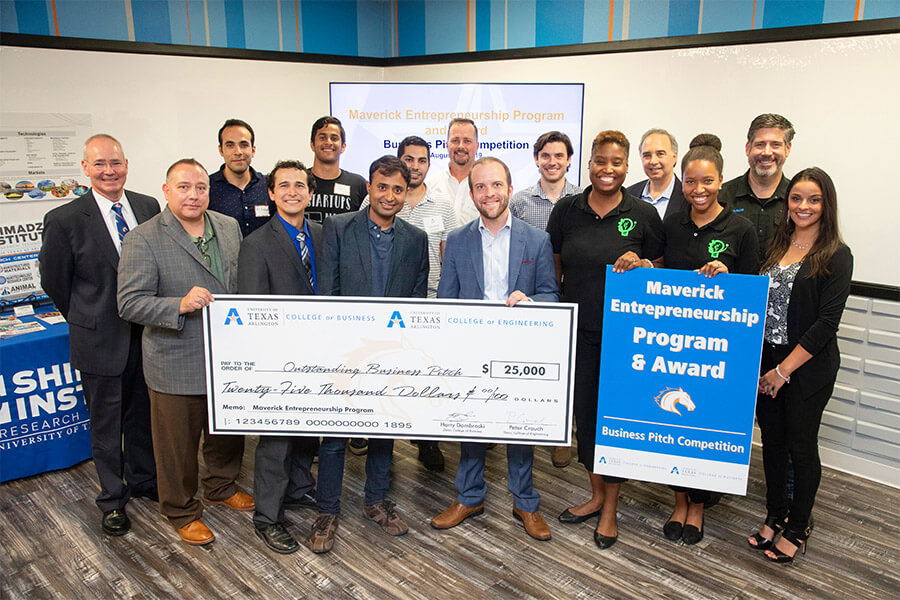
Winners of the 2019 MavPitch grand finale pose with competition judges.
Phase Two participants are also required to participate in EpICMavs Deep Dive, UTA’s in-house, hands-on, seven-week mini accelerator offered in partnership with nonprofit startup incubator TechFW.
Hosted by the Office of Innovation & Commercialization, EpICMavs Deep Dive is free and open to the public, offering guidance on every step of bringing a startup idea to life.
“EpICMavs helped refine my ideas and presentation skills,” Ridout says. “Being able to pitch my company and present to new audiences was new territory for me. I wanted to be able to do it well because I didn’t just have skin in the game, I had my whole body in the game because it’s my own business.”
Dr. Devarajan says students often come to the MEP lacking confidence, but he sees them mature right alongside their business ideas.
“That lack of confidence in the beginning often stems from their business ideas not yet being validated,” he says. “Throughout the various levels of the MavPitch competition, their ideas are validated. By the time they reach Deep Dive, they are much more confident and into the nature of business while they share with peers and mentors.”
The focus on being able to present is critical, as the judging rubrics between the Phase One and Phase Two finales have one key difference: the quality of the presentation.
Not a Big Finish, but a Launch Pad
At the end of their summer Deep Dive, the remaining teams return to the panel of judges for one last live pitch, where they’re each eligible to win up to $25,000 in additional funds.
McGee says, ideally, students use this support to help capitalize their business.
“For the judges to recognize our passion and the place education should have in entrepreneurship made us realize this was possible for us.”
For Starr and Bowman, the funds won from the MavPitch competition allowed them to produce their inaugural ESTe2M Builders at-home STEM project kits as they work to build competence, confidence, and creativity in STEM in children of all ages and learning abilities.
“We’re trying to redefine what STEM means for all communities,” Starr says. “We want to show children and their parents that STEM skills are not far-fetched and that STEM has many facets as we give them the opportunity to engage at any level.”
Now, Bowman says, she feels the sky is the limit for ESTE2M Builders, an optimism she and Starr have brought back to UTA to share as mentors in the MEP.
Ridout says he hopes to do the same someday. He used his funds from MavPitch to set up distributing for Frankly GOOD, but his vision is much bigger.
“I want to remove the stigma around vegan foods and make sure everyone knows vegan food can still be delicious,” he says. “Making money is nice, but the goal here is social impact, and that includes expanding Frankly GOOD to give people jobs—which is more important now than ever.”
Vision for the MEP
After two years with the program, Magnusson describes his time with the MEP and seeing the success of these young entrepreneurs as “energizing.”
McGee harkens back to the first semester of the program, when just 19 students participated, and remarks on the momentum gained in just a short time.
“Not only is the number of students participating increasing, but the caliber of pitches and participants is rising,” he says. “We are reaping the benefits of building a structure into this program and creating opportunities for mentorship.”
Magnusson agrees, noting that fall 2020 is the best start they have ever had for the competition as they make an effort to foster more interdisciplinary collaboration.
The program’s reach will get a bigger boost through the newly established Center for Entrepreneurship and Economic Innovation, which will serve as a vehicle to promote the MEP within UTA and throughout the community and connect budding entrepreneurs with the North Texas business sector.
Despite the challenges that emerged in 2020, Devarajan remains optimistic, saying this is still a good time for students to be starting companies because of the versatility of the product market. Further, he maintains the MEP is a great pathway to that market.
“The biggest problem with starting a company is how exactly to start,” he says. “There are a number of pitfalls awaiting you, and they force you to fall behind—I learned that from my own experience. Figuring it out in this educational environment simplifies it and helps you avoid those pitfalls when you’re ready to launch.” uta
